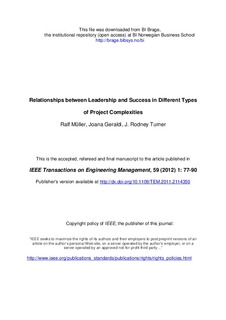Relationships between Leadership and Success in Different Types of Project Complexities
Journal article, Peer reviewed
Permanent lenke
http://hdl.handle.net/11250/2399284Utgivelsesdato
2012Metadata
Vis full innførselSamlinger
- Publikasjoner fra CRIStin - BI [1015]
- Scientific articles [2181]
Originalversjon
IEEE transactions on engineering management 2012, 59(1):77-90 10.1109/TEM.2011.2114350Sammendrag
We investigate the moderating effect of project complexity on the relationship between leadership competences of project managers and their success in projects. Building on existing studies in leadership and project management we assess the impact of emotional (EQ), intellectual (IQ) and managerial (MQ) leadership competences on project success in different types of project complexities. A cross-sectional survey using the Leadership Dimensions Questionnaire (LDQ) and project results questions yielded 119 responses, which were assessed for their type and level of complexity, measured as complexity of fact, faith and interaction. Analysis was done through factor analysis and moderated hierarchical regression analysis. Results show that EQ and MQ are correlated with project success, but are differently moderated by complexity. The relationship between EQ and project success is moderated by complexity of faith. The relationship between MQ and project success is moderated by complexity of fact and faith. Complexity of interaction has a direct effect on project success. ANOVA and non-parametric tests showed the means and medians of EQ, IQ, MQ, complexity of faith, fact and interaction do not significantly vary across different project types. This suggests using these three complexity types as a common language to research and learning across different project types.
Beskrivelse
This is the accepted, refereed and final manuscript to the article
